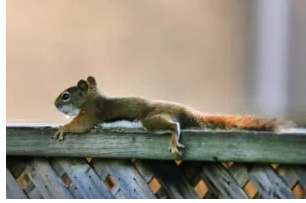Apparently the word "splooting" has gone viral on those platforms I do not frequent, but you probably do, so I won't go on about it. I am merely posting this to test my wife, who like millions of others, does not read this blog, although, unlike them, she contends she does. We have observed a lot of splooting lately, although we did not know it was called that. So, in the next few days when we again see the squirrels in our yard splooting and she does not use that term, I will know she is not taking advantage of the etymological nuggets I often provide and, as well, is fibbing.
For those of you who have not been infected by the splooting virus, I will just say that it is a relatively new word that my spell checker is not recognizing, nor is the OED - yet. Another English dictionary does and if you look in Collins English Dictionary, you will learn this: Splooting - verb (intransitive): (of an animal) "to lie flat on the stomach with the hind legs stretched out behind the body." It may be a derivative of "splat."
Many animals do it and corgis are known to, although they look to me like they are splooting when they are walking. Squirrels have been spotted splooting a lot, which is what caused the word to go viral. Folks should not be concerned, however, since they are just cooling off during these hot times. Ours, however, are simply relaxing and waiting for us to throw the blue jays some peanuts. About squirrels I also will not go on since you will have read my earlier essay where I discuss their, colours, habits, occasional migratory endeavours, ability to swim and how I used to hunt and eat them (you and my wife should see "On Squirrels.")
Sources:
You will already have many from TikTok, Facebook, etc., but here are two from newspapers.
"What Does 'Splooting' Mean: And Why Are Squirrels Doing It?" Adela Suliman, Washington Post, Aug, 12, 2022.
For a BONUS, deep dive see: "City Tells New Yorkers: Don't Panic About 'Splooting' Squirrels: Yes It's a Real Word. Here's the Science (and Etymology) Behind It," Matthew Cantor, The Guardian, Aug. 12, 2022.
It is suggested that it may not be a neologism and actually dates back to the 1950s when it was used in an onomatopoeic manner in cartoons. Or, it could be simply the kind of word we hear pet enthusiasts use in high-pitched voices when offering their pets some "num-nums." "Grant Barrett, a lexicographer and co-host of the radio show A Way With Words, explains that the term comes from Doggo language, a form of canine-inspired internet-speak that has grown into its own tongue. Typically appearing on social media with pictures of dogs, the language features an array of cutesy words including “bork” (a version of “bark”), “mlem” (a kind of tongue movement) and “pupperino” (self-explanatory.)
Enough said.

No comments:
Post a Comment